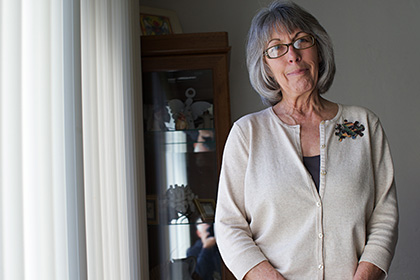AARP Hearing Center

By Lynne Terry
After decades of doing her own taxes, then her children’s taxes, and even helping refugees with their taxes, Pat Fischer gave herself a break in 2010 and used AARP Foundation Tax-Aide.
“It was the biggest treat,” Fischer said. “I didn’t have to worry if I got things right.”
Fischer, a 65-year-old Eugene resident, was among 84,000 taxpayers who used Tax-Aide in Oregon in 2013. The program has 1,200 volunteers across the state who work with taxpayers, filling out forms and e-filing, both with the Internal Revenue Service and the state.
What’s more, the service is free. Bill Ensign, 72, of Beaverton, coordinates the Tax-Aide program in Oregon. He figures it saved clients $9 million last year in fees they didn’t have to pay to a commercial tax service.
“It’s a great service for low-income people and seniors,” said Rick Merryman, 60, of Eugene. He used to do his own taxes using a computer program but encountered some problems in 2009. His payment went through but the IRS never received his forms.
Sharon Looney, the Tax-Aide senior district coordinator for much of southern Oregon, was able to help him.
“She got it all worked out and even got me some money back,” Merryman said.
One goal of the Tax-Aide program is to maximize refunds. Ensign figures Tax-Aide got Oregon clients $16 million back last year through the Earned Income Tax Credit. He said about 85 percent of taxpayers who used the service received refunds in 2013. This year, some may see smaller refunds or even have to pay because of a change in how the medical deduction is calculated.
Extensive training
Tax-Aide’s volunteer counselors undergo extensive training in conjunction with the IRS and the Oregon Department of Revenue. They have to pass an initial test on ethics and tax problems and then take refresher courses each year.
Some, like Looney, 60, are retired licensed tax preparers. Others, like Lillian Karabaic, 26, decided to become part of the program after using Tax-Aide as a client. She said the service helped with her taxes in 2007, and she volunteered the next year to give something back.
“Knowing about tax law is something I find interesting,” Karabaic said. And getting the help they need “makes people happy.”
The program is open to everyone—including non-AARP members—but focuses on helping older residents and those with low to moderate incomes. Counselors cannot handle complicated taxes, such as those involving rentals, depreciation or many business operations.
Clients need to bring these documents to their appointment: 2012 tax returns; a photo ID for all taxpayers and a Social Security card or other proof of Social Security number for everyone on the return; all income information; 1099 forms for Social Security benefits, pensions, annuities, interest income and dividends; receipts or canceled checks if itemizing deductions; and bank routing and account numbers for direct deposit of refunds.
The service uses IRS software, data is encrypted and volunteers go through layers of passwords to sign on. “Our number one priority is security,” Ensign said. “Our number two is the quality of the return.”
There are 130 sites in Oregon, including in community centers, malls, libraries and senior centers. Almost all of them are open specific days, some by appointment only. Go to aarp.org/findtaxhelp or call 211 to find a site.
Lynne Terry is a writer living in Portland































































